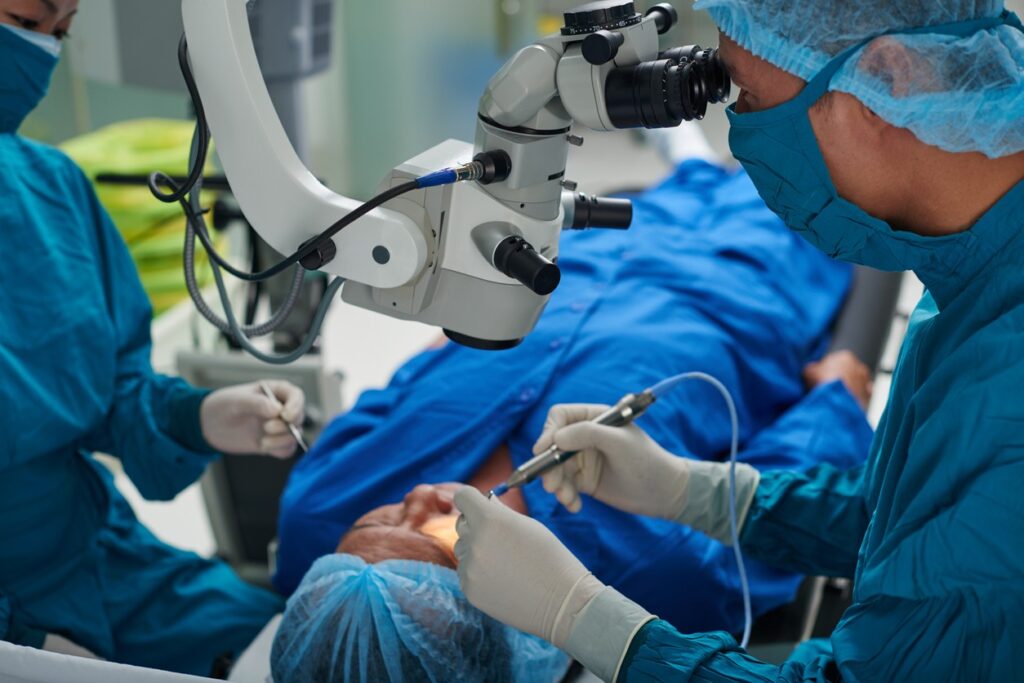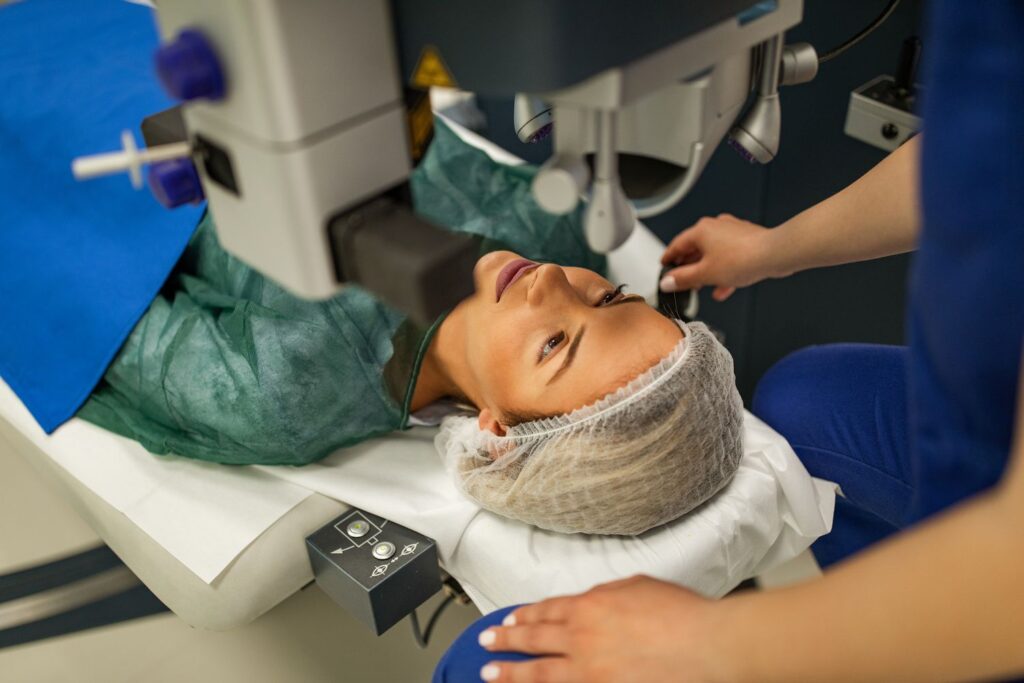Cataract surgery is a procedure that helps to restore clear vision by removing a cloudy lens in the eye and replacing it with an artificial lens. If you have been diagnosed with cataracts and are preparing for surgery, it is essential to have a comprehensive understanding of the procedure and take necessary steps to ensure a successful outcome. This guide will walk you through the various aspects of preparing for cataract surgery, including understanding the procedure, pre-surgery consultation, physical preparation, lifestyle adjustments, and emotional preparedness.
Understanding Cataract Surgery
What is Cataract Surgery?
Cataract surgery is a safe and common procedure that involves removing the cloudy lens, also known as a cataract, from the eye. During the surgery, the ophthalmologist will make a small incision in the cornea and use special tools to break up the cataract into tiny pieces. These pieces are then removed, and an artificial lens, called an intraocular lens (IOL), is inserted to replace the natural lens.
The development of cataracts is a natural part of the aging process, with most people over the age of 60 having some degree of cataract formation. However, cataracts can also develop due to other factors such as eye injuries, certain medications, or medical conditions like diabetes. Regardless of the cause, cataract surgery is a highly successful procedure with a low risk of complications.

Why is Cataract Surgery Needed?
Cataracts cause blurry vision, glare, and difficulty seeing in low light conditions. If left untreated, cataracts can significantly impact your daily activities and quality of life. Cataract surgery is the only effective treatment for removing cataracts and improving vision.
After cataract surgery, most patients experience a dramatic improvement in their vision, with many reporting clearer and brighter eyesight. The recovery process is relatively quick, with patients typically able to resume normal activities within a few days. It’s important to follow post-operative care instructions provided by your ophthalmologist to ensure optimal healing and outcomes.
Pre-Surgery Consultation
Questions to Ask Your Doctor
Before your cataract surgery, it is important to schedule a consultation with your ophthalmologist. This is an opportunity to ask any questions or address concerns you may have about the procedure. Some questions to consider asking include:
What are the expected outcomes of the surgery?
What are the potential risks and complications?
How long will the recovery process take?
Will I require any follow-up appointments?
During the consultation, your ophthalmologist will also discuss the different types of intraocular lenses (IOLs) available for cataract surgery. These lenses can correct various vision problems, such as nearsightedness, farsightedness, and astigmatism. Your doctor will help you choose the most suitable IOL based on your individual needs and lifestyle.
Understanding the Risks and Benefits
Like any surgical procedure, cataract surgery carries some risks. It is essential to have a clear understanding of these risks and weigh them against the benefits of the procedure. Common risks include infection, bleeding, retinal detachment, and swelling. However, the benefits of cataract surgery, such as improved vision and enhanced quality of life, often outweigh the potential risks.
Furthermore, cataract surgery is one of the most commonly performed and successful surgeries in the United States. The procedure is typically quick, with most patients experiencing improved vision almost immediately. The recovery process is also relatively fast, with many individuals able to resume their normal activities within a few days after surgery. To read about after surgery discomforts and complications click here.
Physical Preparation for Cataract Surgery
Health Checks and Medical History
Prior to cataract surgery, your ophthalmologist will conduct a series of health checks and gather information about your medical history. This is to ensure that you are in good overall health and there are no underlying conditions that may increase the risks associated with the surgery. It is important to provide accurate information about any medications, allergies, or previous surgeries.
During the health checks, your ophthalmologist may measure your blood pressure, check your heart rate, and assess your overall fitness for the surgical procedure. They will also inquire about any existing eye conditions, such as glaucoma or macular degeneration, to tailor the surgical approach to your specific needs.
Medications and Supplements
Your doctor may provide specific instructions regarding your medications and supplements before cataract surgery. Some medications, such as blood thinners, may need to be temporarily discontinued to reduce the risk of bleeding during the procedure. It is crucial to follow your doctor’s instructions regarding medications and supplements to ensure a smooth surgical process.
In addition to medications, your doctor may also discuss the importance of avoiding certain herbal supplements that could interfere with the anesthesia or healing process. Common supplements like ginkgo biloba or garlic may need to be stopped prior to surgery to prevent any potential complications. Your ophthalmologist will provide detailed guidance on which supplements to avoid and for how long before the surgery.
Lifestyle Adjustments Before Surgery
Dietary Considerations
Prior to cataract surgery, maintaining a healthy diet can support overall eye health and promote healing. Including foods rich in antioxidants, vitamins, and minerals, such as leafy greens, citrus fruits, and omega-3 fatty acids, can provide essential nutrients for optimal eye health. Antioxidants like lutein and zeaxanthin found in spinach and kale can help protect the eyes from harmful UV rays and oxidative stress. Vitamin C from oranges and strawberries can boost collagen production, aiding in the healing process post-surgery. Omega-3 fatty acids, commonly found in salmon and chia seeds, are known to reduce inflammation in the eyes, potentially speeding up recovery.
Moreover, incorporating colorful fruits and vegetables like bell peppers, carrots, and berries can further enhance your eye health by providing a variety of vitamins and minerals. Carotenoids in orange and red produce are beneficial for maintaining good vision, while the high water content in cucumbers and watermelon can help keep your eyes hydrated and reduce dryness.
Exercise and Rest
Engaging in regular exercise before surgery can help improve circulation and overall well-being. Activities like brisk walking, yoga, or swimming can boost blood flow to the eyes, promoting better oxygen and nutrient delivery. However, it is important to avoid heavy lifting or strenuous activities that could strain the eyes or increase intraocular pressure, which may not be conducive to a successful surgery outcome. Learn more about successful surgery outcomes at https://geiselmed.dartmouth.edu/news/2003_h2/26nov2003_outcomes.shtml
Getting adequate rest is equally crucial, as it allows your body to repair and prepare for the surgical procedure. Quality sleep is essential for the regeneration of cells, including those in the eyes, and can help reduce any pre-surgery anxiety or stress. Creating a relaxing bedtime routine, such as reading a book or practicing deep breathing exercises, can improve your sleep quality and ensure you are well-rested before the big day.
Emotional Preparation for Cataract Surgery

Managing Anxiety and Fear
It is normal to experience anxiety and fear before any surgical procedure. To manage these feelings, consider practicing relaxation techniques, such as deep breathing exercises or meditation. Openly discussing your concerns with your loved ones and healthcare provider can also provide emotional support and reassurance.
Furthermore, engaging in activities that bring you joy and relaxation, such as listening to calming music or spending time in nature, can help alleviate stress and anxiety. Remember, it’s essential to prioritize your mental well-being during this time of emotional preparation.
Setting Realistic Expectations
Before undergoing cataract surgery, it is important to set realistic expectations about the outcome. While the surgery can significantly improve your vision, it may not fully restore it to its pre-cataract state. Understanding the limitations and potential risks of the procedure can help you have realistic expectations and be satisfied with the results.
Moreover, discussing your expectations with your ophthalmologist and asking any questions you may have can provide clarity and peace of mind. Your healthcare team is there to support you every step of the way, ensuring that you feel informed and empowered throughout the cataract surgery process.
By thoroughly understanding cataract surgery and adequately preparing for the procedure, you can ensure a smooth and successful experience. Remember to consult with your ophthalmologist, follow their instructions, and take care of yourself both physically and emotionally. Soon, you will be on your way to clearer vision and an improved quality of life.
Read more at : Eye Surgery Lasik: Is It Right for You?

